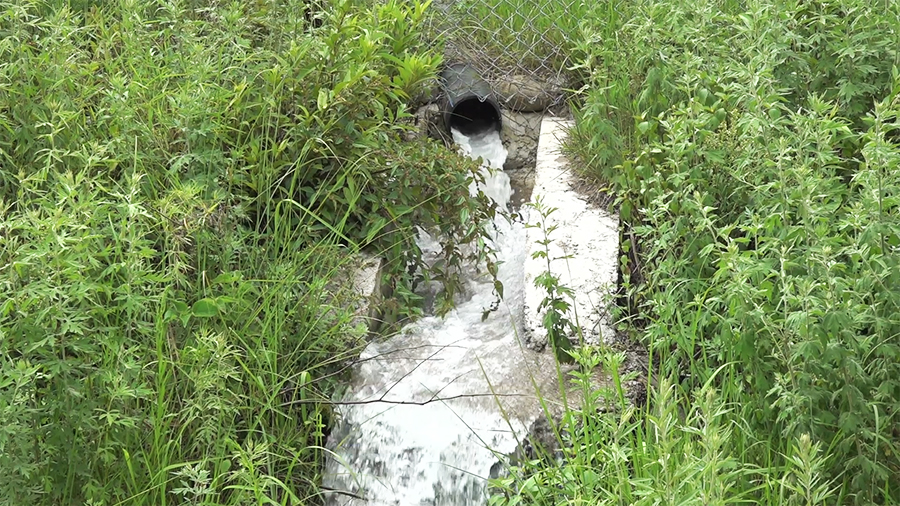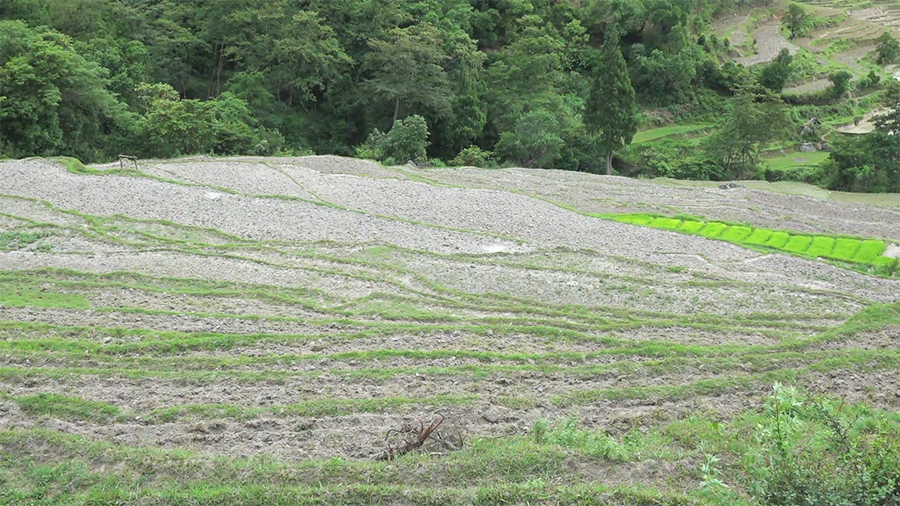
In Tsephu village of Toewang Gewog in Punakha, the shortage of irrigation water has become a severe problem like in other paddy growing areas. The issue has arisen due to a lack of rainfall and scorching heat, leading to dry fields and a delay in paddy transplantation. To address the issue, the farmers of the village are requesting their neighbouring villages Khawakha and Jagra to share their irrigation water from the Dzeko-Lum stream. These two villages possess a solar water pump sourced from the Phochhu in addition to the water from the stream. However, the villagers say that this proposition is not feasible.
 PPresently, only a few households in Tshephu village have initiated paddy plantations, with most of the paddy fields remaining dry. Farmers say nearly half of the paddy plantation works could have been completed by now if there was an adequate water supply. The village has around fifteen households with more than one hundred acres of wetland.
PPresently, only a few households in Tshephu village have initiated paddy plantations, with most of the paddy fields remaining dry. Farmers say nearly half of the paddy plantation works could have been completed by now if there was an adequate water supply. The village has around fifteen households with more than one hundred acres of wetland.
As a regular practice, the villagers of Tsephu share their irrigation water with the neighbouring villages of Khawakha and Jagra, who receive their water from the Dzeko-Lum stream situated upstream of Tsephu.
However, due to the scarcity of irrigation water, the farmers of Tsephu village are now requesting their neighbours to consider allocating a portion of the water passing through their village. This would enable them to carry out paddy transplantation without further delay. They say since the people of Khawakha and Jagra already benefit from the solar water pump supplied by the Phochhu, they should spare some of their water shares from the Dzeko-Lum stream.
“The people of Khawakha, Jarag and Tsephu villages rely on a single small stream. So, we approached the people of other villages to negotiate the water share, considering they have a solar water pump. We have requested them to spare some of their water from the Dzeko-Lum stream, as they already have sufficient water from the solar water pump. We even offered to contribute towards the electricity bill for the water pump,” said Sangay Choden, a farmer.
“Irrigation water is supplied on a rotational basis among the three villages. Jarag village receives water for one night and a day, while Khawakha village gets it for another night and a day. Consequently, Tsephu village only receives water for one day and a night. Previously, we used to complete the paddy plantation work by the middle of the 6th month in the lunar calendar and never left our fields fallow. However, this year, due to the acute water shortage, we are certain that we cannot carry out the paddy cultivation and our land will remain fallow,” said Phurba, another farmer.
“The people of Jarag village have their own solar water pump provided by the government. We would be grateful if concerned agencies could also provide such water pumps for the people of Khawakha so that we need not have to share their water share from here. We are requesting this for only this year. We would be grateful if they could understand our situation and spare their water for us,” said Damcho Wangdi, a farmer.
However, the people of Jarag village said they cannot meet the request for irrigation water sharing as the solar water pump often experiences technical problems, making it unreliable.
They added that the water-sharing system has been in place since their ancestors’ time, established by the Zhung Dratshang and they do not have the authority to negotiate changes to the arrangement.
Most of the paddy transplantation lands in the area belong to the Zhung Dratshang and the farmers pay their shares to the institution at the end of the season.
“We live in the same community and it’s difficult to ignore their request. We also cannot accept their negotiations, as most of the paddy plantation lands belong to the Zhung Dratshang. Likewise, we cannot make such requests to Zhung Dratshang, as we are sustaining under their Kidu. We have told them that we will have nothing to say if they bring an order from the Zhung Dratshang,” said Drali, chairperson of the solar water pump.
The 20 Kilo Watt Khawajagra solar water pump was installed in 2021 by the Bajo Agriculture Research and Development Centre with technical support from the UNDP and funding from the Green Climate Fund Project. It was designed to provide additional irrigation water supply to the people of Khawajagra.
“Our community has been sharing the irrigation water on a mutual understanding basis so far, as they have done in the past. Negotiating with each other and arranging water sharing after completing their own plantation works is the most viable approach. So, I am thinking that this practice is the only best solution to address the issue,” said Tenzin Namgay, Tsephu-Khawakha Tshogpa.
Until an appropriate solution is reached, the people of Tsephu village will have to follow the existing practice of water sharing.
Changa Dorji, Punakha
Edited by Sonam Pem








